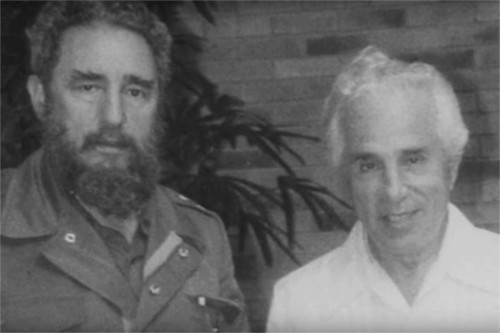 Just two months after Fidel Castro was sworn in as prime minister of Cuba in February 1959, the country’s new leader addressed 1,800 OPC members and guests in the packed grand ballroom of the Hotel Astor.
Just two months after Fidel Castro was sworn in as prime minister of Cuba in February 1959, the country’s new leader addressed 1,800 OPC members and guests in the packed grand ballroom of the Hotel Astor.
An article in the May 1959 Bulletin said 125 reporters, photojournalists and television networks covered the April 23 event. The luncheon drew the largest attendance in the club’s history at the time.
The article quoted Castro as saying the U.S. had given him “more honor than I deserve,” and that he would return to Cuba from his visit as a “man of more faith” in the bond of friendship between his country and the U.S.
A week before his OPC appearance, Castro met with then-Vice President Richard Nixon as part of a post-revolution charm offensive spanning many countries. The tone of his speech was warm. It was only months later that relations between the two countries would begin to sour.
“All the glories of war could be kept in a grain of corn,” he said at the luncheon. “We are only human and human beings can do only a few things.”
Also attending the event was baseball legend Jackie Robinson, journalist Bob Considine (namesake of the eponymous OPC award for best interpretation of international affairs) and Herbert L. Matthews of The New York Times, who won the 1958 OPC George Polk Memorial Award for his interview with Castro in his jungle hideout in the Sierra Maestra mountain range in February 1957. Matthews’ story had given the world a rare sign that the rebel leader was not only alive but “fighting hard and successfully.”
Castro amused the crowd with a story about Matthews’ reporting. “We had eighteen men he thought we were a patrol, but that was our entire army,” he said. “He didn’t ask how many men I had, because he thought it wasn’t right. And I didn’t tell him.”
Since the event, many OPC members and award winners have crossed paths with the Cuban leader.
Longtime United Press correspondent Henry Raymont, who interviewed Castro eight times during his career, will speak at the OPC’s Remembering Castro panel on Feb. 3,
In an email to the OPC, he recalled talking to Castro in Washington for the United Press soon after the revolution. Castro asked to speak with someone knowledgeable about affairs in Latin America because he wanted to catch up on news since he had been “out of touch” while leading the rebellion in the mountains.
“We met for five hours – I talked for three and he for only two,” Raymont wrote. “And I had the chutzpah to tell him that, as far as I was concerned, his revolution could not have come at a worse moment for a ‘dawning awareness’ of Latin American politics.”
Longtime club member Seymour Topping interviewed Castro in November 1983 while working as managing editor for The New York Times. Castro told him that the U.S. had turned its back on him after the revolution, and that the Soviet Union offered support and subsidies.
“But he insisted that while he was taking advice from the Russians, that at no point were they in control of Cuba or determining what policy would be,” he said during an OPC video memoir interview.
Two OPC award winners received accolades for work involving coverage of Castro.
Georgie Ann Geyer of the Chicago Daily News won the 1966 Ed Stout Award for reporting on Communist guerrillas in Guatemala and her “exclusive, wide-ranging” interviews with Castro that were “frank and often heated.”
Laura Bergquist of Look magazine won the 1967 Ed Stout Award for a series on Cuba that judges said included “penetrating impressions of Cuba playing host to a world gathering of revolutionaries, and her own face-to-face confrontation with Castro.”
